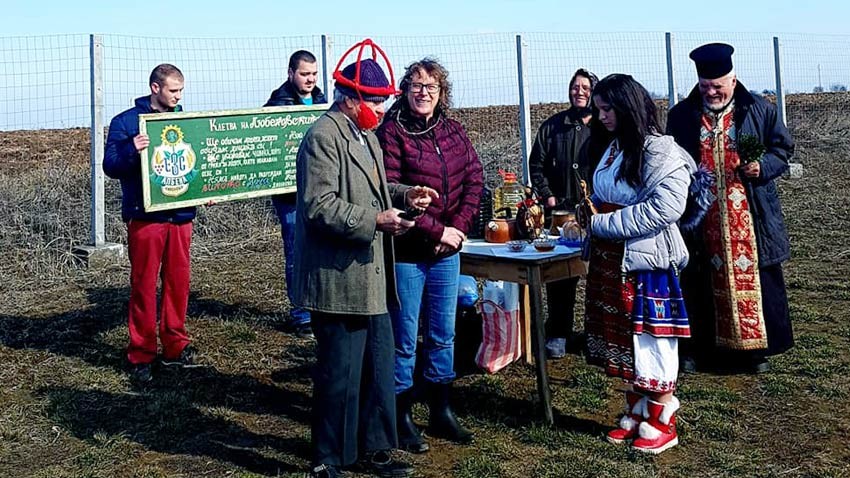Viticulture and winemaking is not reserved for men only. However, not many people are able to produce a true elixir with EU certificate for organic product, to cultivate 30 hectares of vineyards located in some of Bulgaria’s cleanest areas part of the Natura 2000 European network of protected areas and employ dozens of families in one of the most underdeveloped Bulgarian regions. Albena Simeonova is a Bulgarian entrepreneur filled with brave ideas and optimism. She was born in the town of Pernik (Southwest Bulgaria). Albena graduated from the Sofia University Saint Kliment Ohridski majoring in biology and chemistry. Later, she studied Agroecology and Environmental Management in the USA. She has been living in the Danube town of Nikopol in the past 20 years. Albena grows 29 hectares of vineyards on the land of Lubenovo village and is among the biggest wine producers in the Danube region. Albena associated the name of her wine with the Nikopol Plateau, because people follow the ancient vine-growing and wine-making traditions in this Bulgarian region. Albena cultivates land in one of the cleanest regions in Bulgaria and perhaps in Europe. Albena Simeonova was elected Chairperson of the Bulgarian Organic Products Association for her active participation in environmental projects and her efforts in protection of organic farming. The enterprising Bulgarian contends that food manufacture must be orientated towards human health and nature conservation.
 "Organic producers are still facing many difficulties in Bulgaria. However, interest in organic farming has gradually increased. Production of organic wine is not that attractive yet. The Bulgarian people want to feed their children with healthy and organic fruit and vegetables first and are not that interested that much whether the wine they drink is organic or regular. That is why the price of organic wine in this country is similar to the price of conventional wine. I do not use any pesticides, chemical fertilizers or genetically-modified organisms at all. My vineyards are located in the Nikopol Plateau, the region included entirely in the Natura 2000 European network of protected areas. My production volumes increased with another 12 hectares of vineyards. The first wine sold at the latest edition of the International Green Week in Berlin at the end of January this year was a bottle of Muscat from my winery. Although people drink mainly red wines during the winter, this white wine was among the products that attracted biggest interest at the exhibition. My rose wine was also assessed highly by sommeliers and ordinary consumers."
"Organic producers are still facing many difficulties in Bulgaria. However, interest in organic farming has gradually increased. Production of organic wine is not that attractive yet. The Bulgarian people want to feed their children with healthy and organic fruit and vegetables first and are not that interested that much whether the wine they drink is organic or regular. That is why the price of organic wine in this country is similar to the price of conventional wine. I do not use any pesticides, chemical fertilizers or genetically-modified organisms at all. My vineyards are located in the Nikopol Plateau, the region included entirely in the Natura 2000 European network of protected areas. My production volumes increased with another 12 hectares of vineyards. The first wine sold at the latest edition of the International Green Week in Berlin at the end of January this year was a bottle of Muscat from my winery. Although people drink mainly red wines during the winter, this white wine was among the products that attracted biggest interest at the exhibition. My rose wine was also assessed highly by sommeliers and ordinary consumers."

Each wine producer must know well the taste of consumers and diversify its produce, Albena contends. Her wines are mellow and light, because of their lower alcohol content. I export wine to Belgium and Denmark, but also sell my produce on the Bulgarian market, Albena Simeonova says and adds:
"Foreign consumers like my wines, because its taste differs completely from the regular wines. This is due to the high-quality of my grapes. I am among the biggest employers of seasonal workers in Nikopol region. I employ 25 people on permanent contracts, but over 80 people work in my vineyards during the vine-pruning season. I have all necessary modern machinery and equipment for vine growing which cost a lot of money. This job is not suitable for everyone. One must have huge patience and motivation, in order to succeed in this business. The good news is that people now can rely on many European programmes which finance such start-up businesses in organic farming. Most Bulgarian farmers benefit from Bulgaria’s membership in the European Union."
English version: Kostadin Atanasov
Photos: courtesy of Albena SimeonovaThe draft budget for 2025 proposes a deficit of 3%. The mid-term budgetary forecast targets a deficit of 3% up until 2028. The government debt is to increase to EUR 41.57 billion by 2028. The size of pension insurance is to be preserved in..
In 2025, the National Health Insurance Fund will be able to spend 1.2 billion leva (EUR 613 million) more on insured individuals, the draft budget of its Supervisory Board envisages. The health insurance contribution remains 8% of the insurable..
Bulgaria will meet the final criterion of price stability for entry into the eurozone by January. After that, politicians are in charge, Bulgarian National Bank Governor Dimitar Radev has told BNT. "Politicians must try to get the..

+359 2 9336 661
